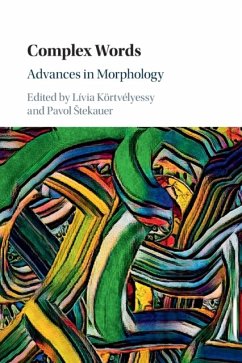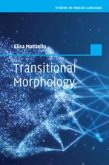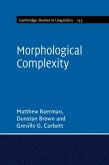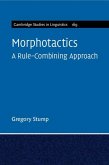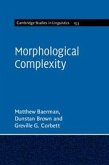Complex Words
Herausgeber: Körtvélyessy, Lívia; Stekauer, Pavol
Complex Words
Herausgeber: Körtvélyessy, Lívia; Stekauer, Pavol
- Broschiertes Buch
- Merkliste
- Auf die Merkliste
- Bewerten Bewerten
- Teilen
- Produkt teilen
- Produkterinnerung
- Produkterinnerung
Presenting the latest ideas in the study of word-formation and linguistic typology, this volume represents the state-of-the-art in methodological and theoretical approaches to linguistic complexity. It brings together research by leading international morphologists to explore multiple aspects of complex words, across a wide range of languages.
Andere Kunden interessierten sich auch für
![Transitional Morphology Transitional Morphology]() Elisa Mattiello (Pisa Universita degli Studi)Transitional Morphology29,99 €
Elisa Mattiello (Pisa Universita degli Studi)Transitional Morphology29,99 €![Morphological Complexity Morphological Complexity]() Matthew Baerman (University of Surrey)Morphological Complexity30,99 €
Matthew Baerman (University of Surrey)Morphological Complexity30,99 €![Morphotactics Morphotactics]() Gregory Stump (University of Kentucky)Morphotactics32,99 €
Gregory Stump (University of Kentucky)Morphotactics32,99 €![Morphological Complexity Morphological Complexity]() Matthew Baerman (University of Surrey)Morphological Complexity125,99 €
Matthew Baerman (University of Surrey)Morphological Complexity125,99 €![The Cambridge Handbook of Morphology The Cambridge Handbook of Morphology]() The Cambridge Handbook of Morphology198,99 €
The Cambridge Handbook of Morphology198,99 €![Transitional Morphology Transitional Morphology]() Elisa Mattiello (Pisa UniversitA degli Studi)Transitional Morphology104,99 €
Elisa Mattiello (Pisa UniversitA degli Studi)Transitional Morphology104,99 €![Making Sense Making Sense]() David CrystalMaking Sense18,99 €
David CrystalMaking Sense18,99 €-
-
-
Presenting the latest ideas in the study of word-formation and linguistic typology, this volume represents the state-of-the-art in methodological and theoretical approaches to linguistic complexity. It brings together research by leading international morphologists to explore multiple aspects of complex words, across a wide range of languages.
Produktdetails
- Produktdetails
- Verlag: Cambridge University Press
- Seitenzahl: 398
- Erscheinungstermin: 6. April 2023
- Englisch
- Abmessung: 229mm x 156mm x 25mm
- Gewicht: 566g
- ISBN-13: 9781108748377
- ISBN-10: 1108748376
- Artikelnr.: 67098308
- Herstellerkennzeichnung
- Libri GmbH
- Europaallee 1
- 36244 Bad Hersfeld
- gpsr@libri.de
- Verlag: Cambridge University Press
- Seitenzahl: 398
- Erscheinungstermin: 6. April 2023
- Englisch
- Abmessung: 229mm x 156mm x 25mm
- Gewicht: 566g
- ISBN-13: 9781108748377
- ISBN-10: 1108748376
- Artikelnr.: 67098308
- Herstellerkennzeichnung
- Libri GmbH
- Europaallee 1
- 36244 Bad Hersfeld
- gpsr@libri.de
Introduction: advances in morphology: a summary Jan Don and Martin
Everaert; Part I. Lexico-Semantic Aspects of Complex Words: 1. Formal
semantics and the problem of nominalizations Rochelle Lieber; 2.
Semantically subtractive morphology Stephen Anderson; 3. -less and ¿free
Mark Aronoff; 4. Instrument Nouns in -one in Latin and Romance Franz
Rainer; 5. Prominence in noun-to-verb conversion Heike Baeskow; 6. On
Spanish dvandva and its restrictions Antonio Fábregas; Part II. Structure
of Complex Words: 7. Estonian case inflection made simple. A case study in
word and paradigm morphology with linear discriminative learning Yu-Ying
Chuang, Kaidi Lõo, James P. Blevins, and R. Harald Baayen; 8.
Uninflectedness: uninflecting, uninflectable, and uninflected words, or the
complexity of the simplex Andrew Spencer; 9. Complex exponents Gregory
Stump; 10. Derivational patterns in proto-basque word structure Juliette
Blevins; 11. The complexity of greek verbal morphology: the case of
prefixed verbs Artemis Alexiadou; 12. Affixoids, an intriguing intermediate
category Angela Ralli; Part III. Corpus-Based Case Studies: 13. Competition
between synthetic nn compounds and nn.GEN phrasal nouns in polish: semantic
niches, hapax legomena and low-level construction schemas Bozena
Cetnarowska; 14. An s is an s', or is it? Plural and genitive-plural are
not homophonous Ingo Plag, Sonia Ben Hedia, Arne Lohmann, and Julia
Zimmermann; 15. The role of word-formation families and subfamilies in the
organisation of German diminutive compounds Wolfgang U. Dressler, Sonja
Schwaiger, and Jutta Ransmayr; 16. Semantic patterns in noun-to-verb
conversion in English Salvador Valera; 17. Onomatopoeia: on the crossroads
of sound symbolism and word-formation Lívia Körtvélyessy, and Pavol
tekauer; 18. Dingsbums and thingy: placeholders for names in German and
other languages Petra M. Vogel.
Everaert; Part I. Lexico-Semantic Aspects of Complex Words: 1. Formal
semantics and the problem of nominalizations Rochelle Lieber; 2.
Semantically subtractive morphology Stephen Anderson; 3. -less and ¿free
Mark Aronoff; 4. Instrument Nouns in -one in Latin and Romance Franz
Rainer; 5. Prominence in noun-to-verb conversion Heike Baeskow; 6. On
Spanish dvandva and its restrictions Antonio Fábregas; Part II. Structure
of Complex Words: 7. Estonian case inflection made simple. A case study in
word and paradigm morphology with linear discriminative learning Yu-Ying
Chuang, Kaidi Lõo, James P. Blevins, and R. Harald Baayen; 8.
Uninflectedness: uninflecting, uninflectable, and uninflected words, or the
complexity of the simplex Andrew Spencer; 9. Complex exponents Gregory
Stump; 10. Derivational patterns in proto-basque word structure Juliette
Blevins; 11. The complexity of greek verbal morphology: the case of
prefixed verbs Artemis Alexiadou; 12. Affixoids, an intriguing intermediate
category Angela Ralli; Part III. Corpus-Based Case Studies: 13. Competition
between synthetic nn compounds and nn.GEN phrasal nouns in polish: semantic
niches, hapax legomena and low-level construction schemas Bozena
Cetnarowska; 14. An s is an s', or is it? Plural and genitive-plural are
not homophonous Ingo Plag, Sonia Ben Hedia, Arne Lohmann, and Julia
Zimmermann; 15. The role of word-formation families and subfamilies in the
organisation of German diminutive compounds Wolfgang U. Dressler, Sonja
Schwaiger, and Jutta Ransmayr; 16. Semantic patterns in noun-to-verb
conversion in English Salvador Valera; 17. Onomatopoeia: on the crossroads
of sound symbolism and word-formation Lívia Körtvélyessy, and Pavol
tekauer; 18. Dingsbums and thingy: placeholders for names in German and
other languages Petra M. Vogel.
Introduction: advances in morphology: a summary Jan Don and Martin
Everaert; Part I. Lexico-Semantic Aspects of Complex Words: 1. Formal
semantics and the problem of nominalizations Rochelle Lieber; 2.
Semantically subtractive morphology Stephen Anderson; 3. -less and ¿free
Mark Aronoff; 4. Instrument Nouns in -one in Latin and Romance Franz
Rainer; 5. Prominence in noun-to-verb conversion Heike Baeskow; 6. On
Spanish dvandva and its restrictions Antonio Fábregas; Part II. Structure
of Complex Words: 7. Estonian case inflection made simple. A case study in
word and paradigm morphology with linear discriminative learning Yu-Ying
Chuang, Kaidi Lõo, James P. Blevins, and R. Harald Baayen; 8.
Uninflectedness: uninflecting, uninflectable, and uninflected words, or the
complexity of the simplex Andrew Spencer; 9. Complex exponents Gregory
Stump; 10. Derivational patterns in proto-basque word structure Juliette
Blevins; 11. The complexity of greek verbal morphology: the case of
prefixed verbs Artemis Alexiadou; 12. Affixoids, an intriguing intermediate
category Angela Ralli; Part III. Corpus-Based Case Studies: 13. Competition
between synthetic nn compounds and nn.GEN phrasal nouns in polish: semantic
niches, hapax legomena and low-level construction schemas Bozena
Cetnarowska; 14. An s is an s', or is it? Plural and genitive-plural are
not homophonous Ingo Plag, Sonia Ben Hedia, Arne Lohmann, and Julia
Zimmermann; 15. The role of word-formation families and subfamilies in the
organisation of German diminutive compounds Wolfgang U. Dressler, Sonja
Schwaiger, and Jutta Ransmayr; 16. Semantic patterns in noun-to-verb
conversion in English Salvador Valera; 17. Onomatopoeia: on the crossroads
of sound symbolism and word-formation Lívia Körtvélyessy, and Pavol
tekauer; 18. Dingsbums and thingy: placeholders for names in German and
other languages Petra M. Vogel.
Everaert; Part I. Lexico-Semantic Aspects of Complex Words: 1. Formal
semantics and the problem of nominalizations Rochelle Lieber; 2.
Semantically subtractive morphology Stephen Anderson; 3. -less and ¿free
Mark Aronoff; 4. Instrument Nouns in -one in Latin and Romance Franz
Rainer; 5. Prominence in noun-to-verb conversion Heike Baeskow; 6. On
Spanish dvandva and its restrictions Antonio Fábregas; Part II. Structure
of Complex Words: 7. Estonian case inflection made simple. A case study in
word and paradigm morphology with linear discriminative learning Yu-Ying
Chuang, Kaidi Lõo, James P. Blevins, and R. Harald Baayen; 8.
Uninflectedness: uninflecting, uninflectable, and uninflected words, or the
complexity of the simplex Andrew Spencer; 9. Complex exponents Gregory
Stump; 10. Derivational patterns in proto-basque word structure Juliette
Blevins; 11. The complexity of greek verbal morphology: the case of
prefixed verbs Artemis Alexiadou; 12. Affixoids, an intriguing intermediate
category Angela Ralli; Part III. Corpus-Based Case Studies: 13. Competition
between synthetic nn compounds and nn.GEN phrasal nouns in polish: semantic
niches, hapax legomena and low-level construction schemas Bozena
Cetnarowska; 14. An s is an s', or is it? Plural and genitive-plural are
not homophonous Ingo Plag, Sonia Ben Hedia, Arne Lohmann, and Julia
Zimmermann; 15. The role of word-formation families and subfamilies in the
organisation of German diminutive compounds Wolfgang U. Dressler, Sonja
Schwaiger, and Jutta Ransmayr; 16. Semantic patterns in noun-to-verb
conversion in English Salvador Valera; 17. Onomatopoeia: on the crossroads
of sound symbolism and word-formation Lívia Körtvélyessy, and Pavol
tekauer; 18. Dingsbums and thingy: placeholders for names in German and
other languages Petra M. Vogel.

